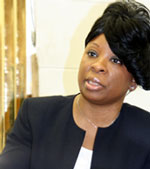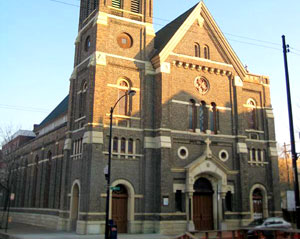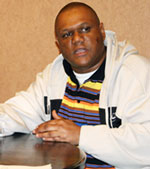Victims of sexual abuse by priests share shocking stories
By Ashahed M. Muhammad -Asst. Editor- | Last updated: Jan 5, 2010 - 5:01:47 PMWhat's your opinion on this article?
Sins of the Fathers - Part II* Click here to read Part 1 of this 3 Part Series

|
Finding the public schools in their neighborhood lacking, like many parents, Alicia's chose to send her and their five other children to a prestigious Catholic school, St. Procopius, located on the lower west side of Chicago.
“My father made it clear to us that we were there for the education,” said Alicia. “Education was very key for my mother and father. They always made it clear that even if you were just a struggling Black person, if you have an education, they can't take that away from you.”

Alicia Sample Photo:: Daniel Hassan Muhammad
|
One afternoon, just two weeks before her 8th grade graduation, Father Terence Fitzmaurice, who at the time was the presiding pastor overseeing the administration of St. Procopius Catholic Church and school, came and got Alicia and her other siblings out of class for an early dismissal.
When Alicia arrived home with her brothers and sisters, they found their mother crying, and were told that their reliable father—the sole provider and backbone of the family—was shot in the back and killed by members of the Chicago Police Department in what they said was a tragic case of mistaken identity.
Alicia said her family was devastated and the smaller children—the youngest being six-years-old—were distressed, sad and confused. Adding to the trauma, the next morning when they went upstairs to wake their grandmother, they found she had died in her sleep. The emotional trauma sent the family into shock.
Alicia said even though they were the only Black children at the school, and though there was some racism, she and her siblings viewed St. Procopius as a “safe place to learn, to prosper and to grow,” and wanted to stay in school.
Being the second oldest sibling in the family, Alicia always felt responsible to protect and look out for her younger brothers and sisters. She said her older brother, Terrence Sample, who was 14 at the time, had begun to act strange, abusing alcohol. She did not know at the time that he was being sexually abused.

St. Procopius Catholic Church
|
“I always listened as they said ‘lead us not into temptation, but deliver us from evil' but they were bestowing evil upon us at the same time,” said Alicia.
Alicia Sample told The Final Call about a six-year ordeal in which she was used as a sex slave, gang raped, sodomized and physically beaten regularly by Fr. Fitzmaurice and others, at his behest.
Fr. Fitzmaurice had a group of young men that acted as his henchmen, and he would sometimes get Alicia out of class during school hours and order Alicia to report to what he called “the clubhouse.”
“It would be explained like I was doing a project or helping with work that needed to be done toward our tuition,” said Alicia.
Once she arrived there, she would be ordered to perform various sexual acts on some of Fr. Fitzmaurice's henchmen, other young priests-in-training, and even other students who went to the school.
Alicia said the priest would order her to perform oral sex on them and tell them to beat her if she refused. He would threaten to have her and her siblings removed from school if she refused to comply with his deviant sexual wishes.
“They would penetrate me sometimes with objects, they would anally rape me,” said Alicia. “Sometimes, they would take all of my clothes and hang me out of the second floor window of the clubhouse and threaten to drop me and say ‘who is going to miss your n----r ass if we drop you?' and my life was just flashing before me,” Alicia said.
Fr. Fitzmaurice also forced her to perform sexual acts on and with him and said if she complied, he would not bother her younger brothers and sisters; however, that proved to be a lie. Thirty years later, Alicia found out that her siblings were abused by Fr. Fitzmaurice. Her sister, who was impregnated when she was 13, had a baby that “came out White as paper,” Alica said.
It doesn't end there
Alicia Sample said Fr. Fitzmaurice would force her and her brother Terrence to commit incest. They would be forced to commit sexual acts on one another while he watched. He would also tell her to do things to her brother, and have her report back whether she did it.
“He (Fr. Fitzmaurice) would become sexually excited, and sometimes he would touch himself in front of me, but if he told me to do something, and I came back and told him I didn't do it, he would beat me. He would get angry and beat me, or he would tell me that I would have to go to the clubhouse and the other guys that would be there would abuse me sexually or beat me,” said Alicia.
For over three decades, she suffered in silence, filled with shame alongside the mental and emotional strain resulting from her abuse as a young teen. She heavily abused drugs and alcohol and suffered from eating disorders. She takes medicine for anxiety, schizophrenia and depression and by her own admission has “been in and out of mental hospitals.”
She also told The Final Call of a 1990 attempt to kill herself and her three sons by sealing the doors and the windows of her apartment and turning on the gas oven. Neighbors smelled fumes, quickly called the fire department and saved Alicia, and her sons from certain death, however, the Illinois Department of Children and Family Services removed the children from her custody.
Now 47, Alicia is still trying to put the pieces of her life back together after having her innocent childhood interrupted by a priest she calls a predatory pedophile.
Terrence Sample, her older brother, who now works as a successful paralegal described his mental and sexual abuse by Fr. Fitzmaurice as consisting of “everything under the sun.” He no longer trusts anyone.
“My dreams were corrupted by the church,” said Terrence. “I'm never going to be the same.”
Terry Overton graduated from St. Rita Catholic high school on the southwest side of Chicago. He was a victim of sexual abuse during his teen years at the hands of Father Thomas Swade, who was defrocked by the Archdiocese of Chicago in October 2009. Mr. Overton, now a successful attorney, described years of feeling intimidated, isolated and abandoned as he struggled with drug addiction to ease the pain of his abuse, which he called part of an “institutional pandemic.”
“It is a stripping of your dignity, confidence and humanity,” said Terry, “I was traumatized for decades,” he added.
Terry said priests in the Catholic church are “god-like figures” and that no one intervened on his behalf because his tormentor was “a White man supported by his White institution,” the Catholic church.
Alicia agrees. She was gripped by the same fear.
“I had to keep a mask on my face like nothing was going on, but on the inside you're crying out like ‘somebody please help me' or ‘can I talk to somebody?' but still in your mind, who is going to believe you?” she asked. “Who is going to believe me over a priest? I'm just a young Black girl.”
James Calmese was a victim of Father John Calicott, a Black Catholic priest at Holy Angels Church who admittedly engaged in sexual misconduct with teenage boys back in 1976.
Like many young Black boys, James enjoyed playing basketball and going out to eat with the rest of the youth at the church, but it came with a price.
“Once he took you to that hotel and pinned you to that bed, you had to take your mind elsewhere and leave your body there,” said James. Fr. Calicott was defrocked by the Chicago Catholic Archdiocese in September 2009.
In a report delivered to The Final Call in late November 2009, specifically responding to allegations of racial discrimination in the abuse settlement process, the Archdiocese of Chicago acknowledged that a majority of the allegations they heard from Black victims involved Terence Fitzmaurice (17 claims) and Victor Stewart (33 claims).
The Archdiocese of Chicago has settled with the claimants in this series of articles, however, Atty. Phillip Aaron, charges that the settlement offers were not made in good faith. Atty. Aaron alleges the Archdiocese of Chicago engaged in legal hardball, offering settlements only to avoid further discovery of evidence that could expose higher-ups in the Archdiocese of Chicago to possible criminal liability if the statute of limitations has not run out.
The Archdiocese of Chicago did reach an agreement with Fr. Fitzmaurice's priestly order, the Benedictines, to contribute to the settlement of claims against him, however, according to Susan Burritt, spokesperson for the Archdiocese, the Benedictines are an entity canonically and civilly separate. Even with that being the case, the Archdiocese of Chicago has made every attempt to address the abuse claims of victims, she said.
Atty. Matthew Walsh, lawyer for the Benedictine Order on behalf of the law offices of Hinshaw and Culbertson, LLP confirmed in a recent telephone interview with The Final Call that Terence Fitzmaurice is deceased.
For these victims, despite receiving financial settlements and the defrocking of priests years later, a sense of justice and closure remain elusive.

David Nolan Photo:: Timothy 6X
|
“My whole world was shaken,” said David, now 42, recounting emotionally and physically painful episodes of sexual abuse and assault.
David remembers the aftermath of the first assault: Fr. Stewart menacingly told him, “You know you wanted it!” Then the priest ordered him to put his clothes on, and took him on a shopping spree at a nearby mall seemingly as a “reward.”
David was confused and scared, but after gathering up enough courage to go to the Chicago Police seeking justice and armed with over 75 names of individuals who had been molested, he was met with scorn and derision. Police laughed and accused him of lying, David recalled.
Living with shame and constant fear of retaliation from the Chicago police and those loyal to Fr. Stewart, David eventually left the church and abused alcohol and drugs to help him cope. He even attempted suicide by drinking a cocktail of Pepsi and anti-freeze.
David feels current Mayor Richard M. Daley shares responsibility, because he was the Illinois states attorney at the time, as well as Bishop Raymond Goedert, a well-respected member of the Chicago Archdiocese, who at that time was the Vicar of Priests.David alleges Bishop Goedert was complicit in the cover-up of rampant sexual abuse and is dissatisfied with the response from Francis Cardinal George, head of the Archdiocese of Chicago.
“Cardinal George has never even offered to sit down and pray with us,” said David, whose abuser, Fr. Victor Stewart, died in June 1994 at the age of 54.
Alicia has received a financial settlement; however, there are other aspects of the settlement, dealing with her medical and counseling needs that church officials have not lived up to, she said.
“It's not about the money, it never was,” said Alicia. “My life cannot be given back to me in a dollar amount.”
She said the abuse shattered her faith in the institution of the Catholic Church, but did not take away her faith in God. She is committed to helping others who may be suffering silently. Her three sons, age 30, 26 and 19, support her.
“I want to help somebody. I want somebody to know that they're not alone. I felt like I was totally alone, just all alone,” Alicia said.
Next, Part III: Seeking Justice: A Crisis in the Catholic Church
(If you are a victim of sexual abuse, contact Black Advocates Universal Against Clergy Sexual Abuse at 888-592-7881.)
Related story:
Sins of the Fathers Part I: Catholic Church accused of denying justice (FCN, 12-08-2009)
INSIDE STORIES AND REVIEWS
-
-
About Harriett ... and the Negro Hollywood Road Show
By Rabiah Muhammad, Guest Columnist » Full Story -
Skepticism greets Jay-Z, NFL talk of inspiring change
By Bryan 18X Crawford and Richard B. Muhammad The Final Call Newspaper @TheFinalCall » Full Story -
The painful problem of Black girls and suicide
By Charlene Muhammad -National Correspondent- » Full Story -
Exploitation of Innocence - Report: Perceptions, policies hurting Black girls
By Charlene Muhammad -National Correspondent- » Full Story -
Big Ballin: Big ideas fuel a father’s Big Baller Brand and brash business sense
By Bryan Crawford -Contributing Writer- » Full Story






 Click Here Stay Connected!
Click Here Stay Connected!








